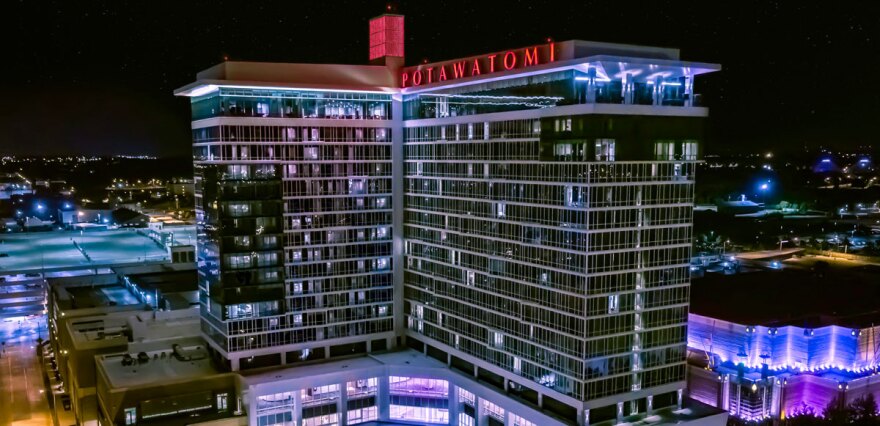At Mole Lake Casino near Crandon, a machine greets visitors even before a person does.
After visitors lower their faces to a camera, the machine scans their forehead, offering an automated invitation to advance if their temperature is below 100.4 degrees.
A security guard checks for mask wearing and asks some health questions before allowing entry to the casino floor.
The sights of the flashing lights and sounds of slot machine jingles are familiar. But there’s something else, too, the faint scent of disinfectant, with wipes and sprays stationed all over.
After ten months of closure due to COVID-19, the Mole Lake Casino started reopening, gradually, two and a half weeks ago.
“We didn’t want to pack the place at first because that’s not very responsible during this pandemic,” said spokesperson Jake Godin. “[But] a lot of other businesses are open, and we wanted to get ours open, too. Everybody needs to generate revenue in order to pay their bills.”

Casinos generated $1.3 billion in revenue for Wisconsin tribes in 2019.
But in March 2020, they were forced to close as COVID-19 swept the state.
That meant hundreds of millions of dollars for tribal health care, education, and social services evaporated as casino revenues slowed or stopped.
Casinos in our area are mostly open again, but things aren’t like they were before. And it could be years before revenues recover.

Many casinos were at least partially open again by June 2020, but Mole Lake Casino, run by the Sokaogon Chippewa tribe, held out.
“We could have opened back in June, too, if we had wanted to,” Godin said. “But the tribe decided it was in their best interests to keep their small community safe by keeping their casino closed, and we actually had the financial means to do so.”
Godin credits a rainy-day contingency fund with giving the tribe that option.
But that doesn’t mean the pandemic hasn’t been deeply painful.

“Our economy, since this pandemic had taken place, pretty much took a nosedive,” said Sokaogon Chippewa Tribal Chairman Robert VanZile Jr.
VanZile communicates regularly with his tribe, hosting a Facebook Live update each Friday.
During these updates, VanZile tells tribal members about the importance of vaccinations, new options for social support, and reopening progress with gaming and lodging.
“We want to get our casino going. We want to work better with our hotel, our bingo, our lodge. All of these things are very important assets in the community,” he said.

Economic losses for the Sokoagon Chippewa are just a piece of the difficulty for tribes across Wisconsin.

A Wisconsin Policy Forum study found tribal gaming payments to the state’s general fund, which takes a cut from the tribes’ net casino win, decreased by 82 percent last fiscal year.
That’s a reflection on how many tribes are struggling financially, says researcher Ari Brown.
“When you take a budget that is so intertwined with what’s happening at casinos, and then say, ‘You can’t go to casinos anymore’ or ‘If you go to a casino, you’re bringing significant health risk to yourself and others,’ obviously there’s going to be a big impact from that,” Brown said.

That impact is perhaps most apparent for the Forest County Potawatomi Community, which operates one casino in Forest County and the state’s largest casino in Milwaukee.
More than 90 percent of the tribe’s budget comes from gaming, and it has lost more than $100 million during the pandemic, says tribal Attorney General Jeff Crawford.
“[Those revenues] fund cradle-to-grave social services programs for our members and our employees,” Crawford said.

Gaming revenues for the Potawatomi play a similar role to tax revenues for the state, Crawford said.
Freefalling casino revenues forced the tribe to slice its statewide workforce of 4,000 employees in half. Every tribal department faced deep budget cuts.
“Our healthcare facility had to take a cut of about 40 percent, which is extraordinary when you think we’re in period of a pandemic,” Crawford said.
He projects casino revenues won’t even recover in the next fiscal year, which starts in October, even though both casino locations have been open since last June.
One lesson learned? Making sure tribal government doesn’t grow too large, making it vulnerable in the event of catastrophe.
“We’ve taken a hard look at that because, frankly, sometimes government can be too big and you don’t necessarily need all of those services. They’re more of a luxury as opposed to a necessity,” Crawford said.

Potawatomi Carter Casino in Forest County just got back to 24-hour gaming this month, although many things still feel different to General Manager Stacey White.

“For our team members, it’s been difficult to not go up to that guest and give them a big hug, because we are those sociable people that enjoy having company from our guests,” White said.
It’s been a challenge to draw in destination visitors from places across Wisconsin, and requirements like sanitizing hands before sitting down at a table game still feel a little odd.
“It took awhile for our guests to be comfortable with what we’re doing here,” said White.

In Mole Lake, gradual reopening of the restaurant and hotel are on the horizon, said Chairman Robert VanZile.
“We’re just trying to deal with it on a daily basis. We want to move forward in a positive manner,” he said.
But like for other casinos, months of lost revenues, and therefore funds for tribal governments, are gone for good.
According to one national estimate, tribes will lose at least $40 billion because of the pandemic.









